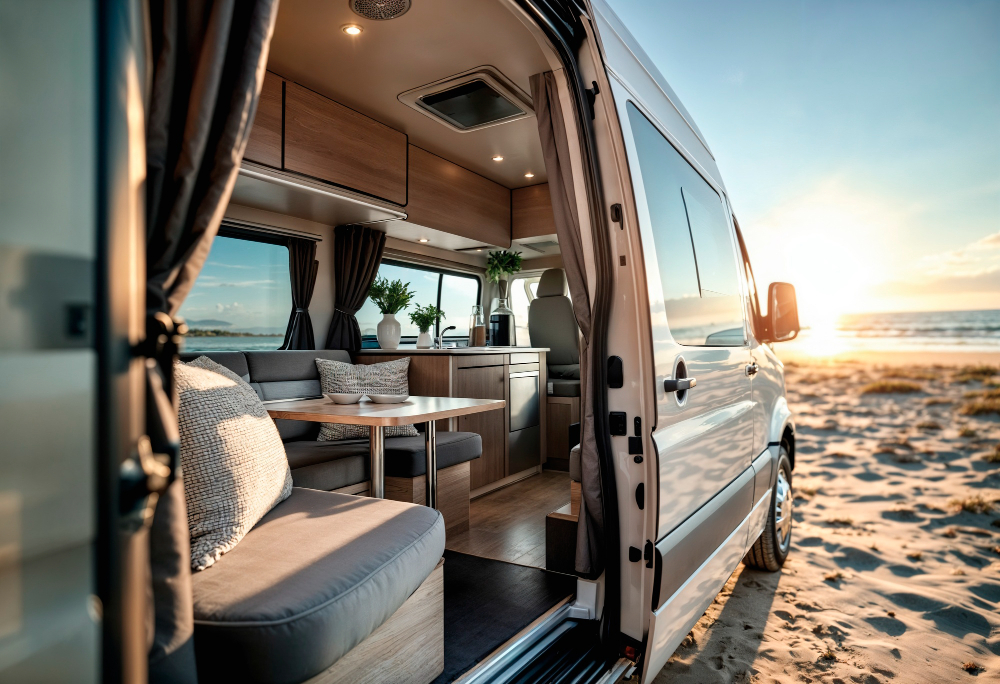The dream of freedom on Spain’s roads, whether in a motorhome or caravan, is attracting more and more adventurers. But before you set off, it’s crucial to know the Spanish traffic regulations to avoid fines and ensure a stress-free journey. The Guardia Civil has clear guidelines that every traveler should observe. This article highlights the most important differences between caravans and motorhomes and provides valuable tips for a smooth road trip through Spain.
Caravan or Motorhome? A Fundamental Distinction for Your Spanish Road Trip
In the eyes of Spanish law, there is a significant difference between a caravan and a motorhome. A caravan is a trailer pulled by a towing vehicle and does not have its own engine. A motorhome (Autocaravana), on the other hand, is a self-contained vehicle with an engine, cab, and integrated living area. This distinction is of utmost importance because the regulations for driving, parking, speeds, and overnight stays vary for both types of vehicles.
A crucial point is the driving license: If your caravan, including luggage, weighs over 750 kg and the total weight of your vehicle combination exceeds 3,500 kg, you will need a B+E driving license. Different rules apply to motorhomes: Up to 3,500 kg, your regular B license is sufficient. If the motorhome weighs over 3,500 kg, a C1 license is required. It is your responsibility to know the exact weight of your vehicle to avoid severe penalties.
Speed Limits, Parking, and Overnight Stays: How to Avoid Fines
Adhering to speed limits is essential in Spain. The Guardia Civil has clear guidelines on this:
Speed Limits for Motorhomes:
- Up to 3,500 kg: 120 km/h on motorways, 90 km/h on regular roads.
- Over 3,500 kg: 90 km/h on motorways, 80 km/h on regular roads.
Speed Limits for Combinations (Caravan with Towing Vehicle):
- Total weight up to 3,500 kg: 90 km/h on motorways, 80 km/h on regular roads.
- Total weight over 3,500 kg: 80 km/h on motorways, 70 km/h on regular roads.
Absolutely avoid exceeding the speed limit, even for a short period, for example, when overtaking.
The question of overnight stays is also clearly regulated:
- Motorhomes: You may sleep in your motorhome as long as it is legally parked and you are not “camping.” This means no awnings, tables, chairs, or other items may extend beyond the vehicle’s contours.
- Caravans: Overnight stays in caravans are generally only permitted on designated campsites or in authorized zones. Inform yourself in advance about local regulations, as these can vary from town to town.
Important Tip: As soon as you set up chairs or a table outside your vehicle, this counts as camping and is not permitted outside designated areas, which can lead to high fines.
Top Tips from the Guardia Civil: Traveling Safely and Legally Through Spain
A relaxed caravan holiday in Spain requires more than just sunshine. Follow these expert recommendations:
- Vehicle Check: Thoroughly inspect your vehicle and caravan before each trip.
- Do Not Overload: Ensure even weight distribution to maintain driving stability.
- Observe Speed: Always drive within the prescribed speed limits.
- Documents Ready: Always carry your driving license, vehicle documents, and insurance proofs.
- Observe Local Rules: Inform yourself about specific local laws regarding parking and overnight stays in the regions you visit.
- Regular Breaks: Take sufficient breaks to avoid driver fatigue, which is a major cause of accidents.
- No Camping in Parking Lots: Do not leave awnings, chairs, or other items outside the vehicle in public parking lots.
- Emergency Kit: A well-equipped emergency kit can be crucial in case of the unexpected.
Conclusion
Be ready for your Spanish adventure! If you have your documents in order, know the difference between parking and camping, and observe the rules of the Guardia Civil, nothing stands in the way of an unforgettable road trip through Spain. If in doubt, do not hesitate to ask the local town hall or a campsite. The official information videos of the Guardia Civil on TikTok are also a helpful resource. Happy travels and enjoy the freedom on Spain’s roads!




